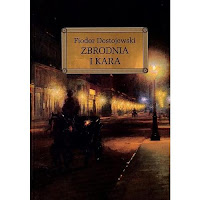
So, it’s time for the first book review in my life! What is even more difficult – it needs to be in English. I hope I’ll manage.
Until today I don’t know why I did not read earlier a work of one of the Russian literature classics – Fyodor Dostoyevsky “Crime and Punishment”. But the time came and now I may share my thoughts with you.
In my opinion it’s an incredible study of human mind and feelings. We’re getting to know inside out the motif of crime, fall, ambition, love, fear, devilry, change… Together with Raskolnikov we’re experiencing his change from a poor ex-student, through determined by ego trip killer, till the final understanding of himself and acceptance of his fate.
The book starts with a description of the life situation of Rodion Raskolnikov – a poor ex-student of law. We’re finding him in his cubby, thinking. He is meditating about the rules in the society, rules of individuals. Is there any division on chosen individuals, who actually may do whatever they want, just to realize their social mission, for the sake of others, ordinary citizens? Is it allowed for them to kill others for that? If yes, shall they be punished for the crime? These and other thoughts are in his head all the time, also when he is going again to visit Alona Ivanova, the shylock. Through this visit he is trying to “check” the place of planned crime. But when he is continuing his meditations he is deciding that he doesn’t want to kill her. However, he receive a letter from his mother and sister, with an information about imminent wedding of his sister. Rodion sees this weeding (indeed in line with the truth) as a sacrifice of Dunya, for the sake of better beginning of his professional life. This information influence his decision and finally he decide to kill the shylock and her sister – Lizaveta. Since then we’re observing his moral and mental torment, meditations about the crime, punishment, society… As a result of the meditation (and also additional factors – people around Raskolnikov, events in which he implicate himself) he decide to go to the police office and confess his guilt. The book is ending with a short description of the first year of his servitude in Siberia, where he goes through the view-of-the-world metamorphosis, he came back to his religion and he waits for the future life with Sonia Semyonovna.
Dostoyevsky created very interesting characters, both, leading and supporting. So, we have for example full of love for the family and continence sister of Raskolnikov – Dunya Romanova. There is also his love - Sonia Semyonovna, good, sweet, religious girl, forced by the situation of her family to sell her body on the streets; who through the help of a few people swear her occupation off and go with Raskolnikov to his servitude in Siberia. Next interesting person is his friend - Dmitri Razumikhin, person, who is with Raskolnikov all the time, he tries to help as much as possible, support, understand – the ideal of a friend. There is also Porfiry Petrovich, detective, who keep playing psychological game with Raskolnikov, not only to make him realize his guilt, but also to understand the reasons of the crime and to find mitigative factors.
Saint Petersburg is shown through the eyes of poor people, we’re getting to know nooks of starving people, districts occupied by shylocks, hookers, drunkards, full of dung and dirt. But also from time to time we may discover a beauty of the city – for example the panorama of the city from the Nicholas Bridge. But in general the city is shown as a rotten city, full of wheeler-dealers and swindlers, being against the foreigners.
To finish – I’m happy I’ve manager finally to read this book. It definitely enticed me for the continuation of my adventure with Russian classics.
And in this way my debut came to the end :)



